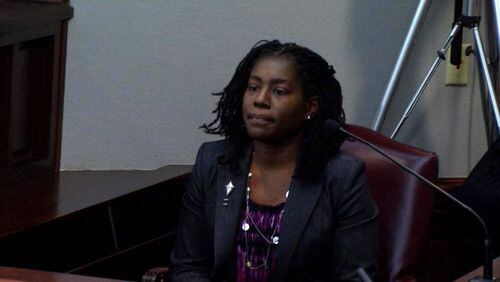One of Ross Harris' close friends testified Monday that he was the one who apparently directed Harris to a website espousing a child-free lifestyle.
Alex Hall, a Home Depot software developer, acknowledged messaging Harris about the idea of living without children. Hall said he sent it to Harris as a joke.
Harris' lawyers showed jurors a transcript of the exchange of messages on April 28, 2014 — weeks before Cooper Harris died in his father's hot SUV. The transcript noted that within two minutes after being sent the child-free post, Harris typed in "grossness."
The postings may explain why lead detective Phil Stoddard testified at a probable cause hearing two weeks after Cooper’s death that Harris had looked at a child-free website. The testimony strongly implicated that Harris killed Cooper because he wanted a child-free lifestyle.
Through his cross-examination Monday of Hall, lead defense attorney Maddox Kilgore strongly debunked such a notion.
Hall and another Home Depot software developer, Winston Milling, testified that Harris did not appear to be acting out of the ordinary on the day his son died in his hot SUV.
Milling and Hall, who planned to start up a new web business with Harris, picked up Harris on June 18, 2014, and took him to lunch at a nearby Publix. At that time, Harris' 22-month-old son Cooper may have already been dead in Harris' car.
The three men also planned to see the movie “22 Jump Street” at five o’clock that afternoon. Milling and Hall went to the movie, but Harris pulled over on the way to the cinema and screeched to a halt in a strip mall parking lot, saying he’d just realized he’d left Cooper in his car all day.
Prosecutors say Harris intentionally left his son in his car to die. Harris’ lawyers say the incident was a gut-wrenching accident.
Even though they were all together at lunchtime, both Milling and Hall said they found nothing unusual in Harris’ behavior. In fact, when asked by Kilgore, Milling said that after Cooper’s death he and Hall got together and racked their brains to see if they’d missed anything in Harris’ behavior.
You found nothing unusual, didn’t you? Kilgore asked.
Milling said they couldn’t think of anything.
“There really wasn’t” anything unusual, Hall, who followed Milling on the witness stand, said.
“Nothing remarkable?” Kilgore asked.
“No,” Hall said.
During his opening statement, lead prosecutor Chuck Boring noted that Harris did not initially tell police that the three men stopped at a Home Depot store so Harris could buy light bulbs for his home. Boring made the point to infer that Harris did not want to disclose coming back to his car, with Cooper's body inside, and tossing the light bulbs in the front passenger seat.
But Milling acknowledged that when he was interviewed by Cobb police after Cooper’s death, he also forgot to tell them they’d stopped at Home Depot for light bulbs.
Earlier Monday, Home Depot employee Regina Malloy testified that, before Cooper's death, Harris brought his guitar into the office because he didn't want to leave it inside his SUV on a hot day.
“The heat will actually warp your guitar,” said Malloy, who plays the bass. “The glue will actually melt.”
Boring asked her if that is why Harris told her he brought his guitar into the office.
It was, she replied.
Prosecutors are expected to argue that if Harris knew his guitar could be badly damaged inside his hot car, he knew the same thing could happen to Cooper.







